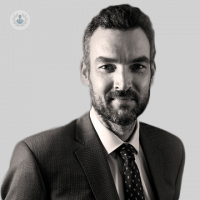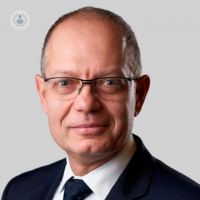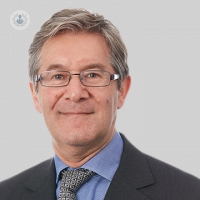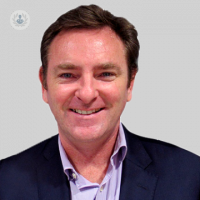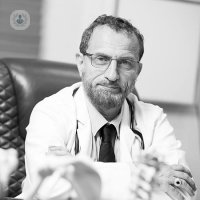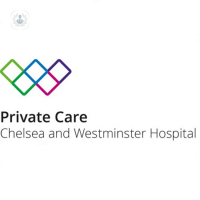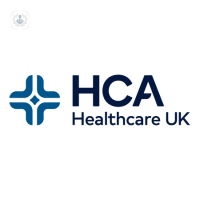What is back pain?
Pain in the back is fairly common and usually goes away after a matter of weeks or months. Individuals can experience pain in any part of the back, from the coccyx at the bottom of the spine to the neck. The most common complaint is low back pain (also known as lumbago).
Depending on the cause of the back pain, a number of specialists may be involved in treating back pain, including neurosurgeons, orthopaedic surgeons, and rheumatologists.
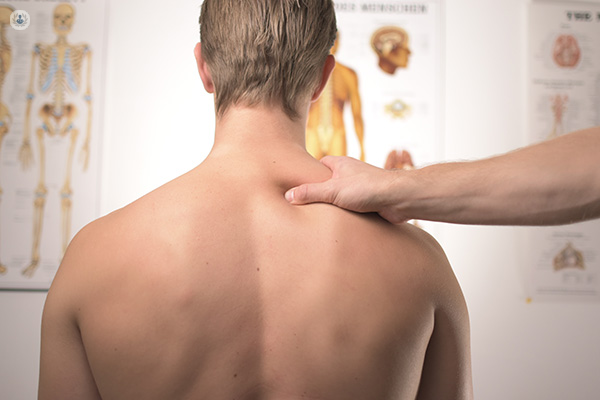
What are the causes of back pain?
Back pain can occur as the result of:
- Injury, e.g. a sprain or pulled muscle
- A slipped disc
- Sciatica
- Ankylosing spondylitis
In the case of the latter three, there are usually further symptoms, such as tingling, numbness, or weakness.
Other causes of back pain are rarely serious and in many cases the cause is not clear (non-specific back pain). Non-specific back pain usually clears up on its own with time.
Can back pain be prevented?
It is impossible to prevent back pain with 100% certainty, but it is possible to reduce the risk of developing pain from musculoskeletal injuries:
- Perform back stretches and exercises regularly
- General exercise – it is recommended that adults do 150 minutes of exercise each week.
- Don’t sit in one position for long periods at work or while driving.
- Maintain a good posture while sitting
- Take care while lifting
- Make sure you sleep on a supportive mattress
- Lose weight if you are overweight.
Back pain relief
In most cases, taking the following measures can provide some relief from back pain:
- Keep active – it is important to try to go about your daily activities as normal. Too much resting in one position can actually make your back pain worse.
- Perform back stretches and exercises.
- Engage in activities such as swimming, walking, yoga, and pilates.
- Apply heat or cold – compresses, hot water bottles, or a bag of frozen peas can all provide short-term relief.
- Take anti-inflammatory painkillers, e.g. ibuprofen.
- Stay positive – there may be some truth in mind-over-matter, since people who stay optimistic seem to recover quicker on average. Remember that the odds are the pain will disappear with time.
Back pain treatment
When to seek medical advice for back pain:
Duration: Seek medical advice if your back pain persists for more than a few weeks, as it may indicate an underlying issue.
Intensity: Intense back pain that hinders daily activities should be addressed promptly.
Worsening: If your pain worsens over time, consult a healthcare professional to rule out serious conditions.
Seeking medical help:
Start with your general practitioner (GP). They may recommend:
Conservative management: Rest, over-the-counter pain relief, and lifestyle changes.
Specialist referral: If needed, your GP may refer you to a specialist.
Physiotherapy: A physiotherapist can provide tailored exercises to strengthen your back and improve posture.
Treatment options:
Group exercise classes: These classes can enhance core strength and flexibility to alleviate back pain.
Manual therapy: Techniques like massage or chiropractic adjustments can relieve muscle tension and joint issues.
Psychological therapy (CBT): Consider CBT for chronic back pain, especially if psychological factors contribute to your discomfort.
Always follow your healthcare professional's advice to effectively manage your back pain.
11-13-2012 07-04-2024
Back pain
Mr Jonathan Bull - Neurosurgery
Created on: 11-13-2012
Updated on: 07-04-2024
Edited by: Kate Forristal
What is back pain?
Pain in the back is fairly common and usually goes away after a matter of weeks or months. Individuals can experience pain in any part of the back, from the coccyx at the bottom of the spine to the neck. The most common complaint is low back pain (also known as lumbago).
Depending on the cause of the back pain, a number of specialists may be involved in treating back pain, including neurosurgeons, orthopaedic surgeons, and rheumatologists.

What are the causes of back pain?
Back pain can occur as the result of:
- Injury, e.g. a sprain or pulled muscle
- A slipped disc
- Sciatica
- Ankylosing spondylitis
In the case of the latter three, there are usually further symptoms, such as tingling, numbness, or weakness.
Other causes of back pain are rarely serious and in many cases the cause is not clear (non-specific back pain). Non-specific back pain usually clears up on its own with time.
Can back pain be prevented?
It is impossible to prevent back pain with 100% certainty, but it is possible to reduce the risk of developing pain from musculoskeletal injuries:
- Perform back stretches and exercises regularly
- General exercise – it is recommended that adults do 150 minutes of exercise each week.
- Don’t sit in one position for long periods at work or while driving.
- Maintain a good posture while sitting
- Take care while lifting
- Make sure you sleep on a supportive mattress
- Lose weight if you are overweight.
Back pain relief
In most cases, taking the following measures can provide some relief from back pain:
- Keep active – it is important to try to go about your daily activities as normal. Too much resting in one position can actually make your back pain worse.
- Perform back stretches and exercises.
- Engage in activities such as swimming, walking, yoga, and pilates.
- Apply heat or cold – compresses, hot water bottles, or a bag of frozen peas can all provide short-term relief.
- Take anti-inflammatory painkillers, e.g. ibuprofen.
- Stay positive – there may be some truth in mind-over-matter, since people who stay optimistic seem to recover quicker on average. Remember that the odds are the pain will disappear with time.
Back pain treatment
When to seek medical advice for back pain:
Duration: Seek medical advice if your back pain persists for more than a few weeks, as it may indicate an underlying issue.
Intensity: Intense back pain that hinders daily activities should be addressed promptly.
Worsening: If your pain worsens over time, consult a healthcare professional to rule out serious conditions.
Seeking medical help:
Start with your general practitioner (GP). They may recommend:
Conservative management: Rest, over-the-counter pain relief, and lifestyle changes.
Specialist referral: If needed, your GP may refer you to a specialist.
Physiotherapy: A physiotherapist can provide tailored exercises to strengthen your back and improve posture.
Treatment options:
Group exercise classes: These classes can enhance core strength and flexibility to alleviate back pain.
Manual therapy: Techniques like massage or chiropractic adjustments can relieve muscle tension and joint issues.
Psychological therapy (CBT): Consider CBT for chronic back pain, especially if psychological factors contribute to your discomfort.
Always follow your healthcare professional's advice to effectively manage your back pain.


Living with lumbar spondylosis: What are the do’s and don’ts?
By Mr Stewart Tucker
2025-01-07
Leading consultant orthopaedic spinal surgeon Mr Stewart Tucker gives an expert guide to degenerative lumbar spondylosis, including the various approaches to treatment and when surgery is necessary. See more


Trapped nerve: signs you should not ignore
By Dr Anthony Hammond
2025-01-07
Do you feel numbness and tingling in the lower back and have problems trying to bend or stand-up straight? It could be a case of a slipped disc compressing on a nerve that's causing the back pain. Our expert rheumatologist Dr Anthony Hammond explains the signs that you should watch out for and the potential risk factors for a slipped disc. See more


How to treat a pinched nerve that’s causing neck, back and/or arm pain
By Mr Dimpu Bhagawati
2025-01-07
Mr Dimpu Bhagawati explains how a pinched nerve could be causing your neck, back and/or arm pain, as well as how it can be treated non-surgically and surgically See more
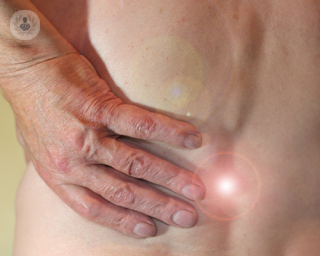

Do I have sacroiliac joint pain or a herniated disc?
By Professor Amarjit Anand
2025-01-07
Learn from a leading spinal surgeon about the overlapping symptoms of sacroiliac joint pain and a herniated disc, as well as how a diagnosis is made and what treatment is available. See more
Experts in Back pain
-
Mr David Bell
NeurosurgeryExpert in:
- Arm pain
- Back pain
- Neck pain
- Sciatica
- Spinal surgery
- Vertebroplasty
-
Mr Christos Tolias
NeurosurgeryExpert in:
- Brain aneurysm
- Degenerative disc disease
- Spinal surgery
- Vascular malformations
- Arteriovenous malformation
- Back pain
-
Professor Roger Wolman
RheumatologyExpert in:
- Osteoporosis
- Osteoarthritis
- Back pain
- Hypermobility
- Inflammatory arthritis
- Sports medicine
-
Dr James Blackburn
Pain medicineExpert in:
- Back pain
- Neck pain
- Neuropathic pain
- Sciatica
- Trigeminal neuralgia
- Cancer Pain
-
Dr Dhiya Houssien
RheumatologyExpert in:
- Back pain
- Elbow Pain
- Fibromyalgia
- Neck pain
- Rheumatoid arthritis
- Osteoarthritis
- See all

Sheffield Orthopaedics Ltd
Sheffield Orthopaedics Ltd
Claremont Hospital, 401 Sandygate Rd, Sheffield
No existe teléfono en el centro.
By using the telephone number provided by TOP DOCTORS, you automatically agree to let us use your phone number for statistical and commercial purposes. For further information, read our Privacy Policy
Top Doctors

Private Care at Chelsea and Westminster Hospital
Private Care at Chelsea and Westminster Hospital
Chelsea and Westminster Hospital, 369 Fulham Rd.
No existe teléfono en el centro.
By using the telephone number provided by TOP DOCTORS, you automatically agree to let us use your phone number for statistical and commercial purposes. For further information, read our Privacy Policy
Top Doctors

The Outpatients and Diagnostic Centre at 30 Devonshire Street (HCA)
The Outpatients and Diagnostic Centre at 30 Devonshire Street (HCA)
30 Devonshire St, London W1G 6PU
No existe teléfono en el centro.
By using the telephone number provided by TOP DOCTORS, you automatically agree to let us use your phone number for statistical and commercial purposes. For further information, read our Privacy Policy
Top Doctors
-
Sheffield Orthopaedics Ltd
Claremont Hospital, 401 Sandygate Rd, Sheffield, SheffieldExpert in:
- Hip
- Orthopaedic surgery
- Orthopaedic spinal surgery
- Shoulder and elbow
- Joint replacement
-
Private Care at Chelsea and Westminster Hospital
Chelsea and Westminster Hospital, 369 Fulham Rd., Central LondonExpert in:
- General Surgery
- Dermatology
- Paediatric Dermatology
- Paediatrics
- Preventive paediatrics
- Adult and paediatric services
-
The Outpatients and Diagnostic Centre at 30 Devonshire Street (HCA)
30 Devonshire St, London W1G 6PU, Central LondonExpert in:
- Orthopaedic surgery
- Orthopaedic spinal surgery
- Musculoskeletal pain
- Musculoskeletal ultrasound
- Spinal stenosis
- Spinal injections
- Most viewed diseases, medical tests, and treatments
- Trigeminal neuralgia
- Chronic headache
- Peripheral nerve block
- Migraine
- Joint pain
- Testicular ultrasound
- Lumbar herniated disc
- Breast ultrasound
- Abdominal pain
- Shoulder pain

